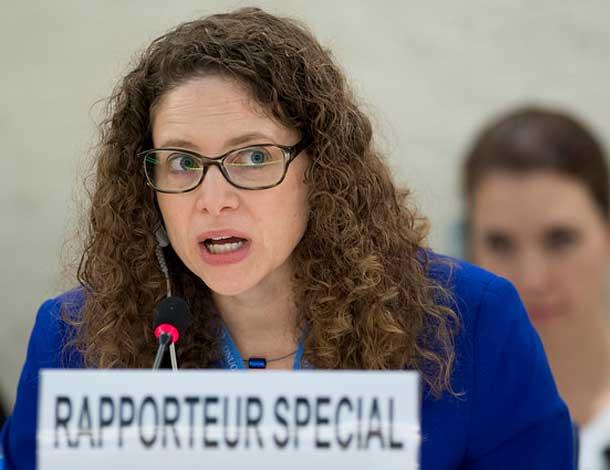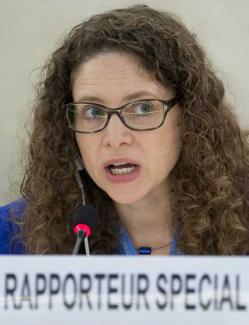Report by the Special Rapporteur in the field of cultural rights
Find out more about the Special Rapporteur
“The international community must stand together. This is a wake-up call for our times. We face a multidirectional global avalanche of hate to which we must have an urgent global riposte. We must build and rebuild the culture of human rights and basic decency everywhere through effective, thoughtful, international law-abiding global action, within a universal human rights framework.”

In her second report to the Human Rights Council (34th session, March 2017), Special Rapporteur in the field of cultural rights Karima Bennoune considers how the rise of fundamentalism and extremism, in diverse forms, represent major threats to human rights worldwide.
At a time of rising fundamentalisms and extremisms of all stripes, the report reiterates that fundamentalisms are not the preserve of one region or religion, and that different fundamentalist movements often reinforce each other through “reciprocal radicalization.”
The Special Rapporteur defines fundamentalism and extremism as ideologies with diverse manifestations but carrying common themes regarding their abuse of cultural rights, such as their attempts at cultural engineering aimed at redesigning culture based on monolithic world views, their limiting of the enjoyment of women’s human rights and restriction of the sexual and reproductive rights of all, and the desire to quash cultural opposition to their own agenda, including through stifling freedom of artistic expression and curtailing scientific freedom.
Of particular interest are explorations on the gendered nature of the assault on cultural rights, as well as the way fundamentalists contribute to other intersecting oppressions, in particular race, ethnicity, and national origin, and sexual orientation and gender identity and expression.
Bennoune describes fundamentalist abuses as a transnational problem that require a transnational response. At the same time, the report reiterates that all responses must be founded on the principles of human rights, offering important cautions against the use of fundamentalism or extremism as an excuse to quash dissent or restrict civil society space. The Special Rapporteur identifies cultural rights themselves as key in dismantling fundamentalisms:
“Cultural rights are critical counterweights to fundamentalism and extremism; they call for free self- determination of individuals, respect for cultural diversity, universality and equality.”
Key Conclusions and Recommendations:
-
Engage in an effective struggle against fundamentalism and extremism so as to protect human rights, including cultural rights, but implement it in accordance with human rights standards. It must not be used as an excuse for violations of human rights.
-
Respect and ensure the human rights of human rights defenders, including cultural rights defenders and women human rights defenders, challenging fundamentalism and extremism.
-
Involve these human rights defenders with the relevant expertise and experience in all programmes and policy discussions at the international level regarding combating fundamentalism and extremism.
-
Remove obstacles for the functioning of an independent civil society that promotes human rights in accordance with international norms
-
Provide for and protect the separation of religion and State and guarantee religious freedom, including the right to believe, not to believe and to change one’s belief.
-
Adopt a gendered approach to combating fundamentalism and extremism - “Every step forward for women’s rights is a piece of the struggle against fundamentalism.”
-
Advocate for policies that combat discrimination in the right to take part in cultural life, and respect and ensure freedom of artistic expression
-
Ensure that schools and curricula are not promoting fundamentalist or extremist ideology, violations of cultural rights or discrimination.
-
Ensure that all victims of fundamentalist or extremist abuses, including in the cultural rights area, have access to an adequate remedy, reparation and compensation, without discrimination.
-
Ensure that those at risk from fundamentalist and extremist violence and abuses, including as a result of exercising their cultural rights, are given asylum, not returned to contexts where they will be at risk and are fully protected from xenophobic attack. Victims of one form of extremism must be supported and protected from being victimized again by other forms of extremism.
-
International civil society needs to do more to document the impact of fundamentalist and extremist ideology and abuses by state and non-state actors and campaign against both, as well as to provide support to the frontline defenders working on these issues.
-
The UN human rights system should engage more systematically with issues of fundamentalism and extremism. An international expert meeting on the human rights impact of fundamentalism and extremism, including on cultural rights, bringing together those who have been working on these issues around the world, including women human rights defenders, should be convened to discuss best practice for responding.
